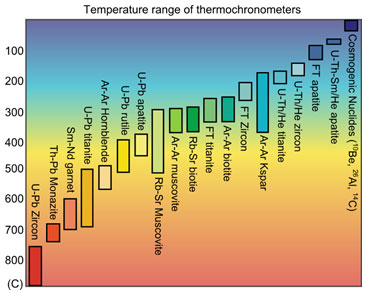What is Thermochronology?
Determining when geological events happened over the Earth’s 4.55 Ga history is a fundamental challenge for Earth Scientists.
All geochronological dating methods rely on the decay of radioactive parent isotopes and production of daughter isotopes (or crystallographic features) in minerals.
Thermochronology specifically exploits minerals (e.g. apatite and zircon) and radio-isotopic systems that are 'closed' over temperature ranges experienced by rocks in mid to shallow levels of the crust and it enables us to constrain the thermal history of the mineral bearing rock.
Thermochronological techniques are uniquely placed to resolve both the timing and rates of geologic processes and have been applied to investigate long-term (1–100 Myr) erosion rates, orogenic mountain building, continental margin evolution, fault movement and timing, and sedimentary basin evolution.
The GES Thermochronology Lab has capability and expertise in:
- Fission Track Analysis
- (U-Th)/He Dating
- U-Pb Dating
- Thermal History Modelling

Summary of different geo- and thermochronological dating techniques and their temperature sensitivity.

